In this installment, we spoke with Sayaka Arimoto, a planner from Dentsu’s Creative Planning Division 1 who has been involved in producing content for television commercials as well as music videos.
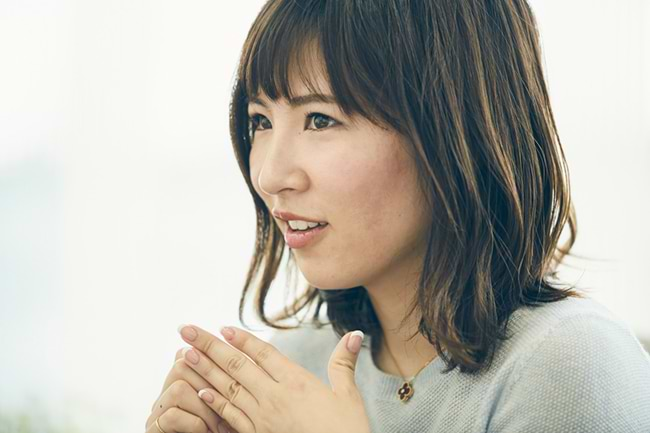
Please tell us about what led you to your current job and what projects you are mainly in charge of.
I have always loved television and have been in charge of making many TV commercials. After doing that for over 10 years, however, I wanted to take on some new challenges. Around that time, I had more and more opportunities to experience new things and think about new businesses and services.
That led to new connections, and as I built up my career, colleagues from various backgrounds began consulting with me about more work opportunities. Among them was a chance to create content for music videos.
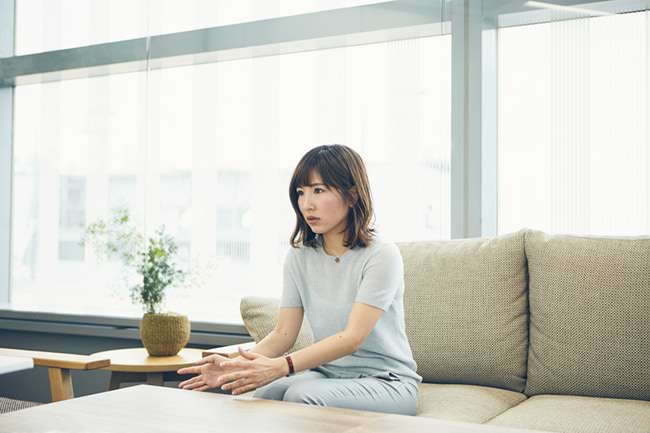
Do you take a different approach in your work when producing an advertisement or creating content for a music video?
I don’t think my approach is very different in either case. The process of creating content is quite similar to when I envision a TV commercial. A music video is not a product in the conventional sense of being an object, but is comprised of music, lyrics, and the artist, so I think about how to present those elements and make viewers like it.
What do you think about specifically when starting a project?
I don’t consider myself to be particularly unique or ingenious; I am a very ordinary person. I am also easily influenced and I like to follow the latest trends, but I have gradually come to accept these things over time. Now I know that I can’t come up with all the answers on my own, and I’m conscious of that when I undertake a project.
In specific terms, I start by searching for answers to some basic questions, like whether the people in my own life would have any interest in the targeted product. If a product already has a fan base, I look at the reasons why they like the product, what aspects of it they like, and what they are currently interested in. People put a lot of energy into the things they like, so I never get tired of exploring these questions.
I also look at people’s posts and comments on the internet, but in most cases, information that you don’t find on the internet or through data is actually more authentic and fascinating. Therefore, I usually talk with people directly to try and find things that are really interesting through them. While those sources are relatively narrow in scope, the information they provide is more in-depth.

For example, when making content for the song “Iiwake” by the artist JUJU, I talked with women in their twenties to forties, the song’s target audience, from among my coworkers and friends. The song is about a woman’s bittersweet memories of a romantic relationship and its lyrics are quite impressive, so I had these women listen to the song and write down their own stories of romantic experiences that came to mind.
The stories they gave me were fascinating and very different, but I discovered something in common: each of the women had such heart-wrenching experiences regardless of their age. I thought that if the video could portray a story that captures the sentimental feelings that all of the women shared, it would sync really well with the lyrics and have an impact on viewers. Therefore, I asked Ai Yazawa, the artist who created the manga featured in the video, to consider those common romantic sentiments from every angle and fully express them through the content.
How to capture changing emotions and common sentiments in a music video without a script
You also created the video content for JUJU’s song “Tokyo,” which became a massive hit on YouTube with over 6.8 million views (as of October 12, 2018).
Like the story in the video, I have also experienced separation from my father, so I drafted a scenario based on real experience from the start. Nevertheless, I followed my usual approach of talking with various people in my life in order to confirm that the scenario was founded on a more objective perspective. After hearing from sales staff, people on the client’s side, and members of the production team, I found something in common in all of their stories. Each of them had experienced separation from a parent or felt a sense of distance from their parents after leaving home and moving to Tokyo. I took great care to convey those feelings in the video scenario.
Among those talks I had with people was a story of a parent’s diary. Unlike a drama, a music video has no script, so I thought a diary would be a very good means to express the emotions and changing circumstances of the scenario. That’s why I incorporated it in the video.

You mentioned that you are a “very ordinary person,” but the ability to incorporate stories and feelings that practically everyone shares into your work by listening to others seems to really set you apart.
I imagine the things that creators really want to make come to their minds quite naturally, but, unfortunately, that doesn’t really happen in my case. Nonetheless, while I can’t come up with all the answers on my own, I do find them in my own way. Perhaps that makes me a little unique.
I can relate to what other people like and talk with people who are the exact opposite of me. I enjoy finding out about their ideas and creating things that I could never have imagined on my own.
An ongoing desire to bring happiness to everyone involved in creating a work
Many people have said that the scenarios you have created for TV commercials are interesting or amusing as soon as one views them, such as the scenario you created for the BIG sports lottery series of commercials, which featured actress Kyoko Fukada and the cross-dressing male television personality Matsuko Deluxe playing two sisters. How do you go about creating such scenarios?
Funnily enough, I watch TV for about six hours every day, and Matsuko Deluxe comes to my mind as one of the most sharp-tongued celebrities in Japan today. Behind that façade, however, he is extremely knowledgeable, warm, compassionate, and modest. I wanted to completely bring out his modest side by creating a scenario that portrays him as a gentle older sister in contrast to an aggressive little sister, played by Kyoko Fukada.

By showing a character always used by a person in a different light and revealing the person’s real hidden virtues, we can get viewers to consider that the person may actually be like that rather than like the character they are so familiar with.
I sincerely respect comedians, but the ones who appear in advertisements often rely on the same old gags. If those gags eventually get boring and tiresome, it’s a real shame. Because I watch a lot of television myself, I try to think of ways that could bring out the talents of the performers appearing on TV and to understand their strong points as much as I can. I believe they can take on new roles, and if their strong points could be brought out more in a commercial, I think even the performers would be happy about that. In other words, I always want to create scenarios that bring out the best in the performers.
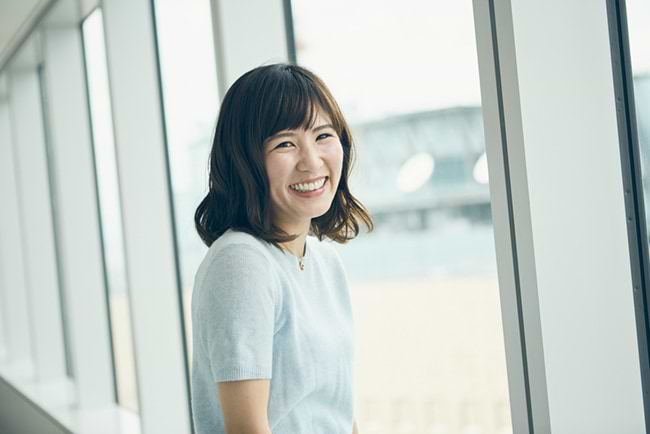
I sense from our discussion here today that you really value your colleagues who are involved in your work.
Thank you. I am always very delighted if I can make someone feel happy.
Nowadays we can see the comments on music videos shown online, and after reading some comments on the videos I was involved in making, I noticed that some viewers said the video brought back memories of their own experiences. My impression was that those viewers were talking about memories that were very special rather than just fleeting thoughts that the video reminded them of. That makes me feel very gratified about making the video.
What are you aiming to do in the future?
Looking ahead, whether in advertising or whatever other project I get involved in, I want to continue placing importance on making my work emotionally relevant for people, so that it can provide viewers with some kind of emotional support. Along with that, I want to keep fostering relationships with my colleagues so that we can combine our ideas dynamically and create something completely original.
-----------------
Linked to her own experiences, Sayaka Arimoto’s work has resonated deeply on an emotional level with many people.
Rather than insisting on her own ideas and preferences, however, she draws on the sentiments of numerous colleagues and reflects that in her work. It is that approach that has made her work so special.
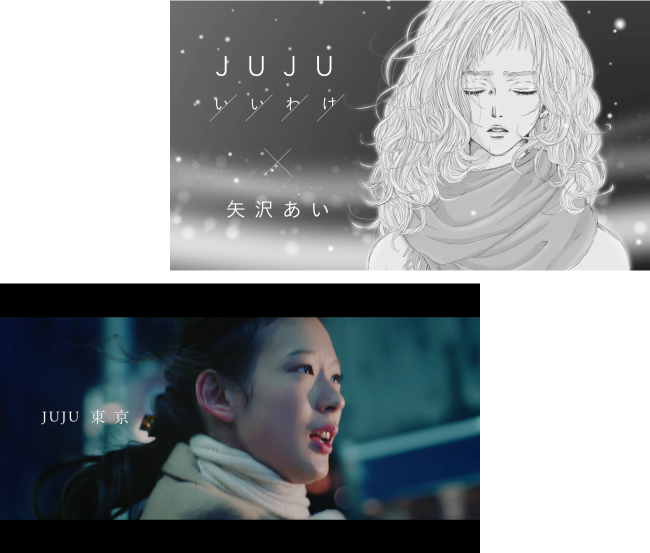
(Below) The video “Tokyo” by JUJU, © Sony Music Entertainment (Japan) Inc.
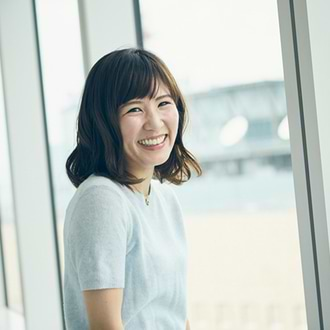
Sayaka Arimoto
Planner / Copywriter
Creative Planning Division 1
